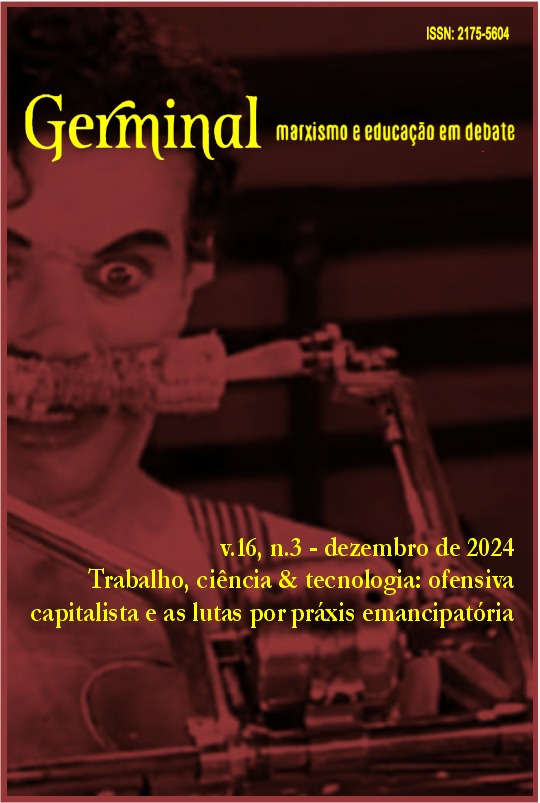Dualistas, Unitárias e a Escrita da História: o modelo do homem provedor no debate feminista britânico
DOI:
https://doi.org/10.9771/gmed.v16i3.59145Palavras-chave:
Inglaterra, Revolução Industrial, Historiografia, Feminismo, MarxismoResumo
Nesse artigo, discutiremos como as teorias dualistas e unitárias se refletiram na prática historiográfica a partir da recuperação do debate feminista-marxista sobre o impacto da Revolução Industrial inglesa nas relações de gênero no interior das famílias trabalhadoras. Tal discussão ganhou forma ao debater o modelo do homem provedor, sua relação com o capitalismo industrial e suas consequências sociais, explicitando como as posições dualistas e unitárias se manifestam no fazer historiográfico. As pesquisas apresentadas apontam para explicações multicausais para um fenômeno fundamental para o entendimento do capitalismo como é caso da relação entre Revolução Industrial e opressão às mulheres.
Downloads
Referências
ALEXANDER, Sally. Women’s Work in Nineteenth Century London: A Study of the Years 1820-50. In: MITCHELL, Juliet; OAKLEY, Ann (orgs.). The Rights and Wrongs of Women. Harmondsworth: Penguin Books, 1976.
AMOS, Valerie; PARMAR, Pratibha. Chalenging Imperial Feminism. Feminist Review, Londres, n. 17, p. 3-19, Autumn, 1984.
BARRETT, Michèlle; MCINTOSH, Mary. The `Family Wage': Some Problems for Socialists and Feminists. Capital & Class, Londres, n. 4, p. 51-72, 1980.
BERG, Maxinne. Women’s work, mechanization and the early phases of industrialization in England. In: JOYCE, Patrick (org.). The Historical Meanings of Work. Cambrige: Cambridge University Press, 1987.
BHAVNANI, Kum-Kum; COULSON, Margaret. Transforming Socialist-Feminism: The Challenge of Racism. Feminist Review, Londres, n. 23, p. 81-92, Summer, 1986.
BOSTON, Sarah. Women Workers and Trade Unions. Londres: Davis-Poynter, 1980.
CARBY, Hazel V. White woman listen! Black feminism and the boundaries of sisterhood. In: CENTRE FOR CONTEMPORARY CULTURAL STUDIES (org.). The Empire Strikes Back: Race and racism in 70s Britain. Londres: Routledge, 1982.
CLARK, Anna. The Struggle for the Breeches: Gender and the Making of the British Working Class. Califórnia: California University Press, 1997.
FRASER, Nancy. Crisis of Care? On the Social-Reproductive Contradictions of Contemporary Capitalism. In: BHATTACHARYA, Tithi (org.). Social Reproduction Theory: Remapping Class, Recentering Opression. Londres: Pluto Press, 2017.
HARTMANN, Heidi. Capitalism, Patriarchy, and Job Segregation by Sex. Signs, Londres, v. 1, n. 3, p. 137-169, Spring, 1976.
HARTMANN, Heidi. The Unhappy Marriage of Marxism and Feminism: Towards a More Progressive Union. In: SARGENT, Lydia (org.). Women and Revolution: A Discussion of The Unhappy Marriage of Marxism and Feminism. Montréal: Black Rose Books, 1981.
HOUSTON, Rab; SNELL, K. D. M. Proto-Industrialization? Cottage Industry, Social Change, and Industrial Revolution. The Historical Journal, Cambridge, v. 27, n. 2, p. 473-492, 1984.
HUMPHRIES, Jane. Class struggle and the persistence of the working-class family. Cambridge Journal of Economics, Cambridge, n. 1, p. 241-258, 1977.
HUMPHRIES, Jane. Protective Legislation, the Capitalist State, and Working Class Men: The Case of the 1842 Mines Regulation Act. Feminist Review, Londres, n. 7, p. 1-33, Spring, 1981.
JONES, Gareth Stedman. Outcast London: A Study in the Relationship Between Classes in Victorian Society. Londres: Verso, 2013.
JORDAN, Ellen. The Exclusion of Women From Industry in Nineteenth-Century Britain. Comparative Studies in Society and History, Cambridge, v. 31, n. 2, p. 273-296, Apr., 1989.
KIRK, Neville. The Growth of Working-Class Reformism in Mid-Victorian England. Londres: Croom Helm, 1985.
KRIEDTE, Peter; MEDICK, Hans; SCHLUMBOHM, Jürgen. Industrialization before Industrialization. Cambridge: Cambridge University Press, 1981.
LAND, Hilary. The Family Wage. Feminist Review, Cambridge, No. 6 (1980), pp. 55-77.
LASLETT, Barbara; BRENNER, Johanna. Gender and Social Reproduction: Historical Perspectives. Annual Review of Sociology, v. 15, p. 381-404, 1989.
LONDON, Jack. O Povo do Abismo. São Paulo: Fundação Perseu Abramo/Editora Expressão Popular, 2020.
MCCLELLAND, Keith. Some Thoughts on Masculinity and the ‘Representative Artisan’ in Britain, 1850-1880. Gender & History, Sheffield, v.1 n.2, p. 164-177, 1989.
MEDICK, Hans. The Proto-Industrial Family Economy: The Structural Function of Household and Family during the Transition from Peasant Society to Industrial Capitalism. Social History, Londres, v. 1, n. 3, p. 291-315, 1976.
ROSE, Sonya O. Limited Livelihoods: Gender and Class in Nineteenth-Century England. California: University of California Press, 1993.
ROSE, Sonya O. Gender at Work: Sex, Class and Industrial Capitalism. History Workshop, Oxford, n. 21, p. 113-31, 1986.
ROSE, Sonya O. Gender Segregation in the Transition to the Factory: The English Hosiery Industry, 1850-1910, Feminist Studies, Maryland, v. 13, n. 1, p. 163-84, 1987.
ROSE, Sonya O. Gender Antagonism and Class Conflict: Exclusionary Strategies of Male Trade Unionists in Nineteenth-Century Britain. Social History, Londres, v. 13, n. 2, p. 191-208, 1988.
ROSS, Ellen. “Fierce Questions and Taunts”: Married Life in Working-Class London, 1870-1914. Feminist Studies, Maryland, v. 8, n. 3, p. 575-602, 1982.
RULE, John. The property of skill in the period of manufacture. In: JOYCE, Patrick (org.). The Historical Meanings of Work. Cambrige: Cambridge University Press, 1987.
SECCOMBE, Wally. Patriarchy stabilized: the construction of the male breadwinner wage norm in nineteenth-century Britain. Social History, Londres, v. 11, n. 1, p. 53-76, 1986.
SEN, Gita. The Sexual Divison of Labor and the Working-class Family: Towards a Conceptual Synthesis of Class Relations and the Subordination of Women. Review of Radical Political Economics, Nova York, v. 12, p. 76-86, 1980.
TAYLOR, Barbara. “The Men Are as Bad as Their Masters . . .”: Socialism, Feminism, and Sexual Antagonism in the London Tailoring Trade in the Early 1830s. Feminist Studies, Maryland, v. 5, n. 1, p. 7-40, 1979.
Downloads
Publicado
Como Citar
Edição
Seção
Licença
Copyright (c) 2024 Germinal: marxismo e educação em debate

Este trabalho está licenciado sob uma licença Creative Commons Attribution-NonCommercial-ShareAlike 4.0 International License.
Autoras e autores que publicam na revista Germinal: marxismo e educação em debate concordam com os seguintes termos:
- Mantêm os direitos autorais e concedem à revista o direito de primeira publicação, com o trabalho simultaneamente licenciado sob a Licença Creative Commons Attribution que permite o compartilhamento do trabalho com reconhecimento da autoria e publicação inicial nesta revista;
- Têm autorização para assumir contratos adicionais separadamente, para distribuição não-exclusiva da versão do trabalho publicada nesta revista (ex.: publicar em repositório institucional ou como capítulo de livro), com reconhecimento de autoria e publicação inicial nesta revista;

